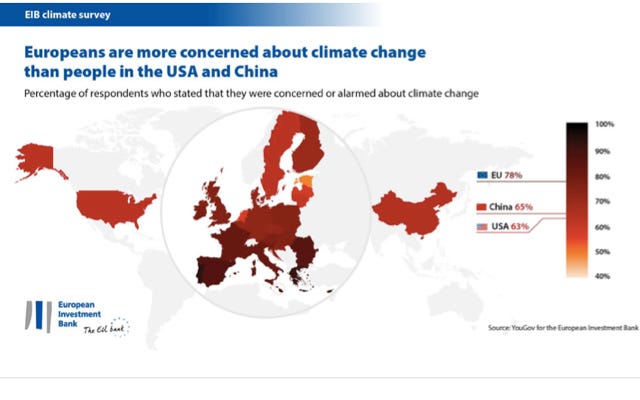I saw an article in an English language Portuguese paper about Portuguese opinions on climate change and what should be done. 91% of respondents agreed they would be willing to take a train, rather than a short-haul flight to save energy. I can’t imagine 91% of the American population agreeing that the sky is blue. So I had to do some research.
Annual EIB Survey
The European Investment Bank is a financial institution and the lending arm of the European Union.
Since its establishment in 1958, the EU bank has invested over a trillion euros. While climate action is a part of everything we do, our activities focus on the following priority areas: climate and environment, development, innovation and skills, small and medium-sized businesses, infrastructure and cohesion. — eib.org
The organization came about as a result of the Treaty of Rome (1957) thus is predates the creation of the EU, yet remains as one of its most important organizations. Non-EU states were granted access in the 1960s and now EIB works with 135 countries.
This is the fourth year, EIB conducted a climate survey. In choosing investments, with the goal of keeping global warming below 1.5 degrees centigrade, they believe it is important to assess public opinion regarding climate change. This year the survey included 25,000 respondents from the EU, US, and China.
2021 EIB Climate Survey
I am not surprised that since the first survey in 2018, those in the EU have shown more concern for climate change than people in the US (and China). I suspect there has been less of a misinformation campaign in the EU. It is hard to discern from the screenshot above but note two things. First, southern Europeans are more concerned about climate change than their northern counterparts and Portugal is an even darker shade than its neighbor.
Fast forward to 2021, and once again, Portuguese concerns grow. Beyond concern, the Portuguese seem to be willing to sacrifice in hopes of saving the planet:
88% consider climate change and its consequences are the greatest challenges for humanity in this century;
85% support stronger government measures that force people to change their behavior;
77% support a tax on products and services that contribute to global warming.
Also interesting is the fact that responses do not seem to be altered by age of the respondent. For example, 77% believe that climate change affects their daily life, and this concern is equally shared by older and younger respondents. And only 5% of the respondents did not think that global warming was caused by human activity.

What Should be Done
In light of recent Russian aggression against Ukraine, it should be noted that unlike most of Europe Portugal does not rely on Russian gas. In fact, the port of Sines may become a strategic point of entry for non-Russian gas. In addition, the Portuguese seem to favor “greener” solutions than other EU countries:
When asked about the source of energy that their country should bet on to combat global warming, Portuguese citizens mostly favor renewable energies (83%, 20 percentage points above the EU average of 63%) to face the climate emergency. In general, the Portuguese are less favorable to nuclear energy than other European citizens (3% vs. 12%). — eib.org
While all these findings may make you smile. There is one part of the survey in which the Portuguese continue to lag behind their European counterparts. It is in the area of waste prevention. Only 9% of Portuguese respondents view this as an imperative. But perhaps, with time and education, this will change.
Speaking of eliminating waste, we found an upscale architectural salvage place. And we will be telling you all about it very soon.
Next Week: is emigration Portugal’s biggest challenge, and answering your questions (or at least some of them).







What an unexpected and wholly welcome topic you've shared today. Your research grounds the attitudes toward climate change and highlights what is being done and can further be done. Yes, I would dearly love taking trains over airplanes through Europe and remain optimistic that the often-reported future lines from Lisbon to Madrid will be realized in my able-bodied lifetime!
This information makes me feel good about Portugal’s approach to climate change and not importing oil and gas from Russia.
I’m wondering where and how they produce most of their energy.
And as far as trains. I understand that Portugal has less access to trains to travel to other countries.